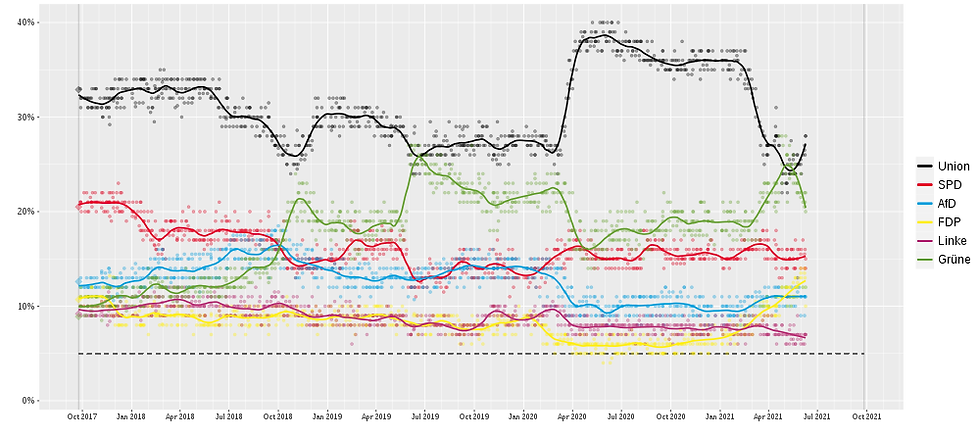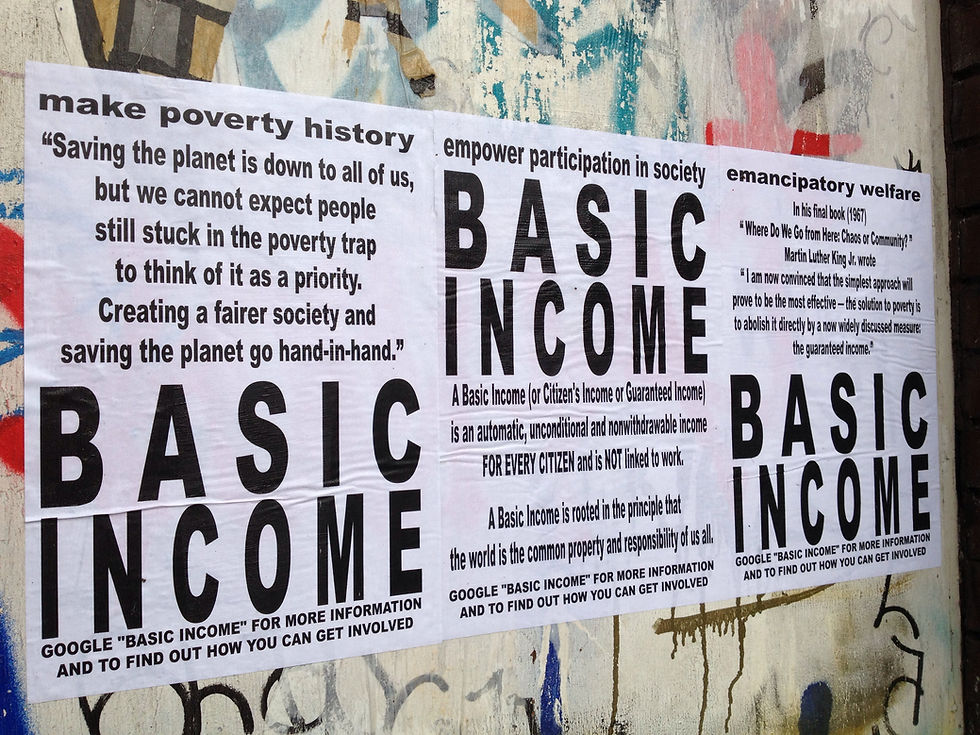A New Germany is Nigh as the Federal Elections Approach
- Dylan Davies

- Jun 24, 2021
- 4 min read
Updated: Dec 23, 2024
On Sunday the 26th of September 2021, Germany will elect their next chancellor. After the incumbent chancellor, Angela Merkel (CDU or Christian Democratic Union), announced she would not run for a fifth term, Germans home and abroad will decide if they want another CDU chancellor, or if they are ready to change after Merkel’s 15 years in office.
First elected in Autumn 2005, Merkel has ruled Germany for over a decade, overseeing crises from the 2008 financial recession to the most recent coronavirus pandemic. Many see her as a beacon of stability in Europe and a well-liked leader internationally. However, by holding on to power for so long and using the so-called "Merkel Method", many have accused her of hurting German democracy. She has been accused of using the policies of other parties to appeal to a wider range of voters: an example of this is the SPD’s (Social Democratic Party) stance on the minimum wage. Before the 2013 federal election, the CDU unveiled a plan to introduce a minimum wage to Germany: an action thought to appeal to left-wing voters, and a policy that the CDU had been opposed to until then. By doing this, some say that Merkel is succeeding in quieting debate and criticism from the SPD, as the plans only differ by a few policy points. Doing this could therefore make any criticising party look hypocritical.
By using the policies of the CDU and sister party CSU (Christian Social Union) to fit in with voters, Merkel has moved the bloc’s political position to become more centrist. Due to this, there is now a gap for a party to appeal to more right-wing voter: a gap that was filled by the far-right, German nationalist party the AfD (Alternative für Deutschland). Founded in February 2013, they first entered the Bundestag (German Parliament) in the 2017 federal election, becoming the third-largest party with 94 seats. Many attribute AfD’s success to its anti-Islam and anti-immigration platform in the wake of the 2016 migrant crisis that saw an estimated 280,000 asylum seekers arrive in Germany, a pertinent drop from the 600,000 the previous year.
Angela Merkel’s departure from the chancellorship also means that the Christian Democratic Union needed to elect a new leader, which is proving to be harder than initially thought. On the 7th of December 2018, the CDU elected their new leader in the form of former Landtag of Saarland member, (Saarland’s regional parliament) Annegret Kramp-Karrenbauer, often referred to by her initials, AKK. In the aftermath of her election, the CDU saw an increase in its vote share. However, that was quickly reversed after months of political gaffes and a failure to connect with voters. This was shown in her first major test as party leader, the European Parliament Election of 2019. Receiving just 28.9% of votes cast, the worst result ever recorded by the CDU, it was seen by many as a failure by Kramp-Karrenbauer and she later resigned in February 2020 as a result of the Thuringian government crisis.
After the departure of AKK, the CDU found itself looking for a new leader for the second time since Merkel’s resignation. Almost a year after Mrs. Kramp-Karrenbauer’s resignation, the CDU voted once more for a new leader on the 15th and 16th of January 2021. Norbert Röttgen, former minister of nature conservation and the environment was eliminated first, only receiving 224 votes or 22.65% of votes cast. This meant that Armin Laschet, former minister-president of North Rhine-Westphalia, and Friedrich Merz, former German MEP, would continue into the next round. Merz, the frontrunner in the first round, lost his lead to Armin Laschet, who received 52.79% of second-round votes—thus making him the new leader of the CDU.
2021 opinion polls

The instability within the CDU/CSU (shown above as the Union), has caused party popularity to fall to historic levels. The most recent polling shows the CDU with a lead of 9.5%, a significant recovery from a poll conducted in April 2021 depicting a CDU loss to the Green party by 7%. A loss seems like a real possibility for the Union, ending a 15-year hold on the European nation.
Despite this, a win seems like a real possibility for Die Grüne (Germany’s Green Party). Although their numbers have fluctuated, the Green Party sees a Green chancellorship as a real possibility, putting forward their first candidate for chancellor since their creation in 1980. Their choice is Annalena Baerbock, a member of the German Bundestag for Brandenburg since 2013. If Baerbock convinces the German people she is right for the chancellorship, she vows to create “climate-friendly prosperity”, which would see an annual investment of €50 billion in socio-economic transformation. Along with this, they seek to create a good life in the city and the countryside, which would entail creating practical rail and bus services and nursing care with fairly paid nurses.
The 2021 federal election is a key election for the German people and the people of Europe. We could see one of the first Green Party leaders as a German chancellor, highlighting to every other democratic nation the increasing importance of the environment as a voting factor. This is an election that could also see the end of the two-party dominated chancellorship between the CDU and the SDP, giving hope to voters that the system can change.

_edited.png)



Comments